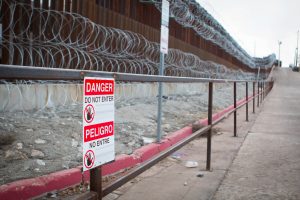- Slug: BC-CNS-Emergency Declaration Lawsuit. 545 words.
- File photo and caption below.
- Video here.
By NICOLE LUDDEN
Cronkite News
PHOENIX – Sixteen states have filed suit against President Donald Trump’s national emergency declaration last week, but Arizona isn’t among them.
The attorneys general of California, Colorado, Connecticut, Delaware, Hawaii, Illinois, Maine, Maryland, Minnesota, Nevada, New Jersey, New Mexico, New York, Oregon, Virginia and Michigan filed a complaint on Monday opposing the national emergency declaration, which the president declared after Congress refused to fully fund his request for barriers along the southern border. California Attorney General Xavier Becerra is leading the state lawsuit, which comes on the heels of lawsuits filed last week by several activist groups.
Texas is the only other of the four border states that did not join the suit.
Arizona Attorney General Mark Brnovich did not respond to a request for comment.
After reaching an agreement on a spending bill to avoid another government shutdown, Trump announced that $6.6 billion in military and drug-interdiction funds would be made available to build a border wall, which has been his key campaign promise.
“Such use would divert counter-drug programming funds directed to the states, and military construction funds to be spent in the states,” the 16 plaintiffs assert.
Rep. Tom O’Halleran, D-Ariz., has said the funding would consist of $3.5 million from the Pentagon’s military construction fund, $2.5 billion from the Pentagon’s drug interdiction initiative and $600 million from the Department of Treasury’s drug-forfeiture program.
Gil Kerlikowske was commissioner of U.S. Customs and Border Protection from 2014 to 2017, and is a fellow at the Baker Institute Mexico Center, specializing in border issues. He said he does not see an emergency at the U.S.-Mexico border.
“Well, we know that the drugs, especially marijuana seizures, along the border have gone down for a pretty good number of years,” he said. “We also know that the people aren’t attempting to evade the Border Patrol, they’re people that essentially turn themselves into the Border Patrol trying to make a claim of credible fear.”
While working in the Obama administration, Kerlikowske said, CBP processed 68,000 unaccompanied children at the U.S. -Mexico border.
“They were able to handle that, and there’s really no reason that they shouldn’t be able to handle this also,” he said.
Kerlikowske also said increased technology use by CBP officials has led to a safer border.
“The technology, I think, has been far more effective at reducing the numbers though then a barrier than a wall.”
A main point of contention involving the construction of a physical barrier is how it would be paid for.
In a tweet Friday, Sen. Martha McSally, R-Ariz., publicly addressed the concern over cuts to military funding in Arizona.
“I support @POTUS’s goal, which is to further fund border security,” McSally said. “I will continue to study the emergency declaration and additional funding proposal to ensure it increases border security while not adversely impacting our military.”
Gov. Doug Ducey apparently doesn’t share that concern. He tweeted his support for the president on Friday, saying, “Arizona has watched for decades as Washington has failed to prioritize border security. It’s unfortunate it has come to this rather than Congress doing its job. But action is needed. I support President Trump’s plan to secure our border.”
The Department of Justice has not publicly commented on the lawsuits.
– Video by Austin Westfall/Cronkite News
Have a story idea? Email us at cronkitenews@asu.edu.
For more stories from Cronkite News, visit cronkitenews.azpbs.org.
^_=
